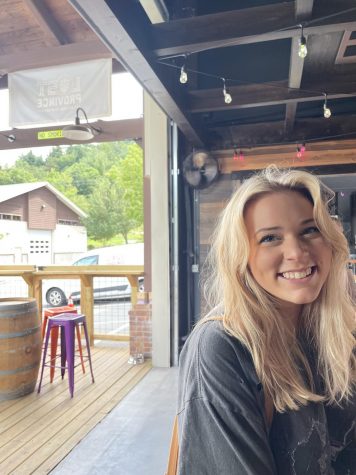‘We would have been homeless’: residents reflect on Boone’s housing
April 19, 2022
Angel Jackson’s bathroom flooded with sewage while she was giving birth to her first child over a year ago, one of the many problems she encountered while renting an apartment in Boone.
Jackson said she and her family have spent years moving from one property to the next in search of an affordable, quality place to live.
“We looked for a place to rent for the better half of a year without any luck before settling for buying, which we didn’t want to have to do for several more years in order to be able to buy our more ideal forever home,” Jackson said.
According to the 2021 NCGrowth Housing and Resiliency Report, the median home value in Boone is 50% higher than those in neighboring counties, though the median household income remains the lowest in the High Country. The report also documented a 28% increase in Boone rent prices from 2009 to 2019.
As a result, a large portion of Boone’s workers commute from adjacent areas to prevent homelessness while keeping their jobs, said town council member Todd Carter.
Carter said in a 2021 interview he spent almost 10 years driving from Ashe County to Boone for his job at the Hospitality House of Northwest North Carolina, an organization dedicated to helping individuals experiencing homelessness. Carter said it wasn’t until just over a year ago that he was able to move to Boone when layoffs and hardships caused by COVID-19 made Hospitality House’s services more necessary. While many other jobs switched to an online platform, this wasn’t an option for Carter and other Hospitality House staff.
“I’ve dedicated my life to Boone, at least the last decade, making this a better place. My story is all too common, whether it’s a faculty member, an adjunct professor, other non-profit folks, other people who work in Boone but can’t afford to live here,” Carter said.
A large portion of workers in Boone are employed through the university or work in the retail and service industry, which are typically lower-paying occupations, according to the 2021 Housing Needs Assessment of the High Country. The report also found that 45% of Boone’s population lives below the poverty level, and 48% of the renters in the area spent half of their income on housing costs last year.
Town council member Dalton George said the increasing disparity between household income and home values can be largely attributed to the thousands of App State students populating Boone.
“It kind of creates this fake going rate in the market,” George said. “It’s a super complicated issue when the people moving here are often carried by money not made here. You can’t really account for that in a traditional economic way.”
The New York Times conducted a study in 2017 that stated the median household income of an App State student’s family was $107,500. The Census Bureau reported the median household income in Boone was $25,535, a difference from incoming students’ families of over $80,000.
George said App State’s growth consistently brings in more students, creating an even higher demand for housing. App State reached record high enrollment in 2021 with 20,641 students, according to University Communications, marking a 3.1% increase in overall enrollment since 2020.
“We have this very interesting institution that’s increasing growth that other economies and housing markets don’t really have,” George said.
George said High rent prices are possible because of the high demand for housing from students coming from wealthier areas who are able to afford it. The 2021 Housing Needs Assessment surveyed 38 off-campus housing units having an occupancy rate of 99.9%, signaling a necessity for housing in the area, according to the assessment.
The shortage of available homes makes people more willing to live in substandard housing conditions, George said. This was true for Angel Jackson and her family, who said they dealt with a multitude of issues while renting in Boone.
Jackson’s wife works at the Children’s Council, a program focused on preparing children to succeed in school, according to their website. Working in Boone has allowed Jackson and her family to form connections in the community. Jackson didn’t want to leave the area because of their established roots; however, they couldn’t afford to stay. She was eventually able to find a home in Ashe County, a 30-minute commute to Boone.
“If that house fell through, and it almost did several times, we would have been homeless with our infant and family and new baby on the way. We even planned to invest in a tent and camping equipment in case it happened,” Jackson said. “We ended up having to move into the house we were trying to buy before closing on it because we had nowhere else to go.”
Callie Dunn moved to Boone from Tryon, North Carolina in 2018 to start her freshman year at App State. In 2019, Dunn dropped out of school but decided to stay in Boone after growing attached to the area. However, Dunn was forced to move back home last summer after unsuccessfully searching for an affordable, pet-friendly place to live.
“This past summer trying to find another place to live, it was just borderline impossible to find something per friendly that I could afford,” Dunn said. “It’s frustrating when things don’t work out and there’s not really any options. Pet friendly is really, really hard to come by in Boone.”
Dunn has continued searching for a place in Boone since moving back home in the hopes of returning soon.
“In Boone, I was looking to set down roots and stay there. I was really interested in building more of a life for myself there as opposed to moving from apartment to apartment,” Dunn said.
Similarly, an App State student who wished to remain anonymous first moved to Boone for their education. After working multiple jobs in the area, they are now a graduate student studying wildlife biology and living with their partner, an alum of the university.
In 2018, they said they were able to find a studio apartment in Boone for $500 per month, though it wasn’t long before the ceiling of their apartment started leaking.
“Mold grew under the carpet and on my clothes and furniture, and it took weeks to have the roof repaired,” they said. “Other repairs that took weeks included a hole in the chimney that allowed a group of flying squirrels to repeatedly enter the house.”
Additionally, the student said their chimney stopped venting smoke, which was never repaired during his time in the property. They said they were also charged for the mold stains on their floor resulting from the leaky roof.
They and their partner are currently looking to move from their current home, which the student said has its own “fair share” of issues.
“Now we’re even more concerned about finding a place to live in August. We have seen a few rentals in our price range but haven’t been able to pull the trigger in time,” they said.
Many of the local leases overlap with the student’s current lease, making their search more difficult as they can’t afford to pay rent for two places even if just for a few months. Additionally, the student said many of the rentals they’ve been able to find “aren’t ideal” in terms of where they and their partner work.
Carter said experiences like these are far too common in Boone because Watauga County doesn’t have many substandard housing regulations. Substandard housing includes housing in a state of neglect, which doesn’t include adequate or safe plumbing, electricity, heat, a kitchen or has otherwise been deemed unfit to live in by the government, according to the National Housing Law Project.
“They live in substandard places that have black mold and should not be inhabitable,” Carter said.
George said many people in the area tolerate inadequate housing conditions to avoid conflict with their landlords, which creates a power imbalance between the renter and the property owner.
“It creates this really bad problem for tenants where there’s really no power that they have in that relationship with renting, and obviously, lack of affordable housing exacerbates that,” George said. “If you are living in a place that’s under $500, you’re probably going to do anything to stay there no matter how bad it is.”
Landlord Judi Scharns has owned properties in Boone for 30 years and said the majority of her experience with tenants has been positive. However, she said she’s had issues renting properties, namely with damages going unreported by tenants that worsen with time.
Over the years, Scharns said she has been forced to raise rent prices primarily to maintain the properties and keep up with escalating taxes and insurance costs.
“The location of one property requires flood insurance, which is some of the most expensive insurance you can buy. The cost rises almost annually. My cost is more than 10 times what it was when I first started renting the one property that requires it,” Scharns said.
Despite costly expenses, Scharns said she never raises rent while a tenant is currently renting through her and always waits until after they move out to set a new price.
“Every time people leave, we put work and investment into the houses, each time improving comfort and affordability for our tenants. These improvements were considered in setting the new rent,” Scharns said.
George said finding a solution to affordable housing isn’t an easy feat due to the many factors contributing to the issue. While George said affordability can’t happen overnight, he’s looking to the community to help solve the issue.
The Hospitality House is hosting a four-part housing forum until April 25th, where community members gather to discuss the problem and potential solutions.
Town council members, county commissioners, social workers, real estate agents and university members are among some of the prominent community figures taking part in the forum, George said. Those who wish to participate can register for free through Hospitality House’s website.
“We’re all talking about housing solutions. This is the first time that’s ever happened in the High Country. The energy around solving the problem and discussing it is really there,” George said.
















